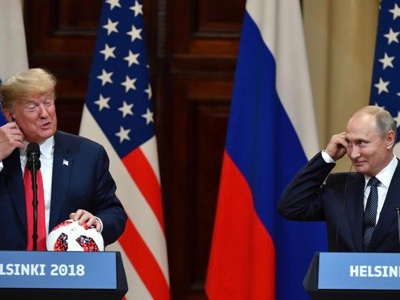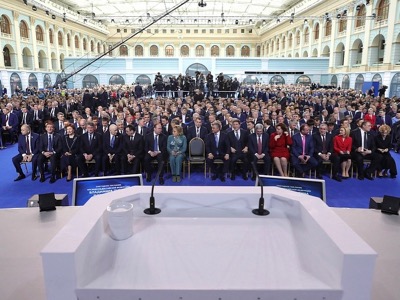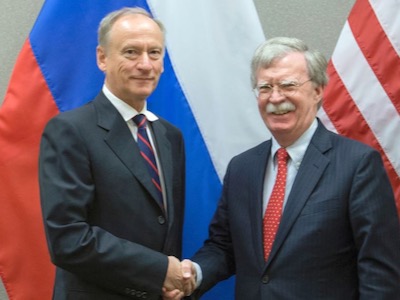To make peace, it’s quite simple: you just have to stop making war with each other. But in the Greater Middle East, it is much more complicated, because there are a multitude of actors for whom a solution, whatever it may be, must satisfy conflicting claims. Under these conditions, no peace can be totally just, but it can at least, and must, guarantee the security of all.
This article is a follow-up to : "How Washington intends to triumph", by Thierry Meyssan, Voltaire Network, June 23, 2020.

Throughout 2011 and the first half of 2012, the United States and Russia secretly discussed their plans for the Broader Middle East. The Pentagon was pursuing the Rumsfeld/Cebrowski strategy, i.e. the plan to destroy all state structures (Afghanistan, Iraq, Libya, Syria...), but President Barack Obama was looking for a way to withdraw militarily from the region so that he could transfer his troops to the Pacific Ocean, around China ("Pivot to Asia"). Russia, for its part, hoped to regain its influence in the region by relying on the Russian-speaking population of Israel and Syria.
We do not know the content of these discussions, which were difficult. A polemic opposed the two powers throughout the month of June, each accusing the other of being on the "wrong side of History" [1]. 1] In any case, Washington and Moscow jointly convened an international conference in Geneva about Syria, but without any Syrians, on June 30, 2012. Both, aware that the war in Syria was not a civil war, concluded a peace treaty between them before their respective allies as witnesses. All believed that, despite the military inequality between the two protagonists, a new Yalta, a new division of the world, had taken place and that this Treaty was the first manifestation of it [2].
A week later, however, the French president, François Hollande, organized a meeting of the "Friends of Syria" in Paris to revive the conflict. [3] NATO allies, in the presence and with the complicity of Secretary of State Hillary Clinton [4], were causing the Obama-Putin negotiations to fail. The master of ceremonies of the Geneva conference and former UN Secretary General Kofi Annan denounced the double game of one of the protagonists and resigned with great fanfare from his position as UN special envoy for Syria on August 2. Concerned, a part of the Non-Aligned countries [5], then China [6], proposed to pick up the pieces without succeeding.
Nine years of war followed.
In 2020, while the Pentagon steadfastly pursues the Rumsfeld/Cebrowski strategy, President Donald Trump is secretly negotiating not only with his counterparts Vladimir Putin, Bashar el-Assad, Benjamin Netanyahu & Benny Gantz, but probably with many others.

Contrary to popular belief, the contradictions on the US side are not new since they already existed 9 years ago, under Barack Obama. They are therefore not due to Donald Trump, but to a deep and long-standing crisis in the United States that Westerners refuse to consider. Unlike his predecessor, he does not seek to move his pawns from one region of the world chessboard to another, but to bring his troops home. Russian demands, for their part, have increased considerably. Moscow has invested itself militarily in Syria and has shown there the power of its reborn military industry and its new army. Russia, once in ruins after the collapse of the USSR and the internal plunder of Boris Yeltsin [7], has become a Great Power again, giving itself the capacity not only to defend itself, but also to destroy its US rival, which it is the only state in the world to be able to envisage. We are talking about global governance, it is indeed a question of power relations.
We do not know what the negotiations between the White House and the Kremlin will be like in 2011, but we can infer what is at stake from current events. Either the war that is tearing apart all the states in the region one by one continues, or the two great powers will divide the region into separate zones, or they will manage them together. It is obviously possible to mix these options: apply one of these three formulas throughout the region or several depending on the country.
Any agreement must be based on a realistic analysis of the Greater Middle East and not on newspaper headlines. The media do not report on the real balance of power in the region because they treat the conflicts as if they were separate from each other, which is absolutely not the case. Any agreement here has consequences for others so that peace for some may mean disaster for others.

Contrary to popular belief, neither the Palestinians nor the Kurds are central today. They have lost their legitimate cause by claiming to build national states outside their historical territories. Neither the Turks nor the Iranians represent any danger; they are always ready to negotiate under the table. The problem that has made everything fail for forty years is the willingness of some Anglo-Saxons to continue the colonisation of the region via Israel and the resistance of some Arabs via Lebanese Hezbollah. However, Israel’s colonial faction led by Benjamin Netayanhu is today losing ground to the nationalist faction led by Benny Gantz. On the other hand, Hezbollah can no longer count on its two godfathers: Syria, which is very weakened, and Iran, which has just made a pact with the British in Yemen, reached an agreement with the United States in Iraq and allied itself militarily with the Muslim Brotherhood in Libya.
Therefore, any lasting solution requires both :
– a co-management of Israel by the United States and Russia and by
– management of Lebanon and Syria by Russia, under US supervision.
This development will take place sooner or later, despite the opposition of some Israelis, Lebanese and Syrians, because it is the only one that can guarantee the security of all.
The Russian side has already reorganized itself in this direction. The Russian ambassador for the Levant, Alexander Zaspikin, is already concentrating on Lebanon alone where he is posted, while the new Russian ambassador in Damascus, Alexander Efimov, has acquired the possibility of reporting directly to President Putin without going through his ministry, where his predecessor in Syria, Alexander Kinshchak, will supervise the region.
What is at stake today has already failed a very large number of times since the end of the Second World War, but the region has evolved and so have the Great Powers. Donald Trump is very realistic, while Vladimir Putin has a keen sense of international law. If they both manage to bring their views on the Greater Middle East closer together, this will have immediate positive consequences in the Far East.
[1] “On the Right Side of History”, by Sergey Lavrov, Voltaire Network, 16 June 2012.
[2] “Action Group for Syria Final Communiqué”, Voltaire Network, 30 June 2012.
[3] «Discours de François Hollande à la 3ème réunion du Groupe des amis du peuple syrien», par François Hollande, Réseau Voltaire, 6 juillet 2012.
[4] “Clinton at Friends of Syrian People Ministerial Meeting”, by Hillary Clinton, Voltaire Network, 6 July 2012.
[5] “Final Statement from Tehran Consultative Meeting on Syria”, Voltaire Network, 9 August 2012.
[6] “The Chinese solution”, by Thierry Meyssan, Translation Pete Kimberley, Information Clearing House (USA) , Voltaire Network, 7 November 2012.
[7] All the large companies in the USSR were publicly owned. President Boris Yeltsin gathered friends around a table and handed out the industrial jewels. While the president’s friends instantly became billionaires, the life expectancy of Russians fell sharply by 15 years. It took President Vladimir Putin a decade to restore the standard of living of his fellow citizens and the status of his country.

 Articles by this author
Articles by this author Send a message
Send a message










Stay In Touch
Follow us on social networks
Subscribe to weekly newsletter